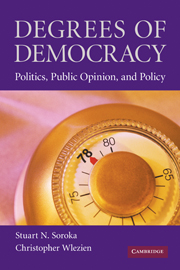Book contents
- Frontmatter
- Contents
- Preface
- Degrees of Democracy
- 1 Public Opinion and Policy in Representative Democracy
- 2 The Thermostatic Model
- 3 Adding Issues and Institutions
- 4 Public Preferences and Spending
- 5 Parameters of Public Responsiveness
- 6 Public Responsiveness Explored
- 7 Policy Representation
- 8 Disaggregating Public Responsiveness and Policy Representation
- 9 Degrees of Democracy
- Appendix
- Bibliography
- Index
- References
1 - Public Opinion and Policy in Representative Democracy
Published online by Cambridge University Press: 05 June 2012
- Frontmatter
- Contents
- Preface
- Degrees of Democracy
- 1 Public Opinion and Policy in Representative Democracy
- 2 The Thermostatic Model
- 3 Adding Issues and Institutions
- 4 Public Preferences and Spending
- 5 Parameters of Public Responsiveness
- 6 Public Responsiveness Explored
- 7 Policy Representation
- 8 Disaggregating Public Responsiveness and Policy Representation
- 9 Degrees of Democracy
- Appendix
- Bibliography
- Index
- References
Summary
Edmund Burke was a much better political philosopher than he was a politician. Burke was a Member of Parliament for Bristol for six years, from 1774 to 1780. He visited the constituency infrequently during that time, and managed to alienate his electorate through a combination of his rather unpatriotic support for America during the war and a general lack of attention to the principal concerns of Bristol's merchants. It was clear by 1780 – when he withdrew – that Burke stood no chance at reelection.
Burke's political writings remain fundamental to this day, however, including his Speech to the Electors of Bristol. In his mind, an elected representative should seek and consider the advice of his constituents, but that advice should not be authoritative instruction. It should not serve as a mandate, dictating what a representative does; it should be but one input into his decision making. Burke's philosophizing did not free him from the burden of representing the interests of his electors, however, and his ideas evidently had only limited appeal for Bristolians at the time. That is, Burke paid the electoral price.
The situation is little changed more than two hundred years later. Active representation of the public's policy preferences remains a – if not the – central concern in electoral and inter-electoral politics. Indeed, some argue that the tendency to represent public preferences has increased as politics has become a career path during the twentieth century, and that politicians have become (out of desire for reelection) more reliably interested in keeping voters happy (e.g., Maestas 2000, 2003).
- Type
- Chapter
- Information
- Degrees of DemocracyPolitics, Public Opinion, and Policy, pp. 1 - 21Publisher: Cambridge University PressPrint publication year: 2009

